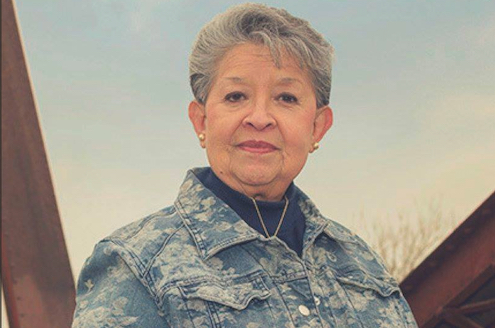Experience, communication help Margaret Gómez tackle difficult issues
Friday, December 22, 2023 by
Ken Chambers With more time logged in office than the other commissioners on the court, Travis County Precinct 4 Commissioner Margaret Gómez is able to bring a long-term perspective to county government.
Gómez took office in 1995, making her the longest-tenured commissioner currently in office. But her career with the county began long before that.
A graduate of the Austin Citizens Police Academy, a program designed to educate citizens about the Austin Police Department, Gómez was elected constable in 1980. She served until 1993, when she campaigned for county commissioner.
Gómez has seen the long-term impact of government projects and policies. She cites the county’s challenges with Central Health, the county health district, as one prominent example.
Central Health was created in 2004 to provide health care services to low-income Travis County residents. It has made headlines in recent years for legal disputes, a massive contingency fund and questions about how many patients it actually serves. After a promising beginning in the Texas Legislature, where the law allowing the creation of hospital districts was passed in 2003, Central Health has been a disappointment for Gómez.
“The legislation was written to address poor people so that they would not be denied health care,” she said. “That’s what really frustrates me; the legislation was written with a purpose in mind.”
The legislation required the county to essentially transfer the money it had been investing in health care to Central Health, she said.
“The assumption was they would carry on and continue providing that health care,” she said. “But that didn’t happen.”
A demographics report released by Central Health in February showed that it enrolled 111,027 people in its health plans in 2021, down 8.4 percent from 2019. Central Health cites the pandemic as a factor in this decline.
The law creating health care districts obligated counties to provide oversight, she recalled.
“There was a reason the Legislature didn’t just say, ‘Here, you operate independently.’ They’re attached to Travis County for approval of the tax rate and budget.”
This makes the county and commissioners responsible for Central Health’s shortcomings, Gómez said.
“We’re leaving a lot of people out. I think of the folks who were suffering and even died because they didn’t have health care.”
More answers about Central Health are expected soon. The results of the county’s performance audit of Central Health is scheduled to be presented to commissioners in January.
Drug addiction and homelessness are Travis County’s other big challenges, Gómez said. Federal funds totaling $247.4 million from the American Rescue Plan Act have made a big difference.
The Coronavirus State and Local Fiscal Recovery Funds from the American Rescue Plan delivered $350 billion to states, territories and local governments. Travis County split its SLFRF funds into three tracks: Track 1 to address the impact of Covid-19; Track 2 for housing and social services; and Track 3 for the county’s direct and joint response.
The county dedicated almost 60 percent to Track 2 for housing and social services. The largest allotment – $35 million – went to the expansion of Mobile Loaves and Fishes’ residential program, called Community First! Village. Currently home to more than 350 people, the master-planned neighborhood providing affordable, permanent housing for people exiting homelessness will house 500 when completed.
The need becomes more urgent as cold weather arrives.
“We have another winter coming on, and these people are going to be out in the elements again,” she said. “I’m not the most patient person. Never was. But I have forced myself to calm down, you know. Just keep trucking.”
Like Central Health, the SLFRF funds also come with responsibilities, she said.
“It really concerns me that we didn’t get a playbook with those federal funds,” she said. “You know, what to avoid, what was eligible, what we could do. And so we had to figure that out ourselves along with the attorneys. We’re constantly going back to the feds asking ‘Is this OK? Can we do this?’”
Many county projects take years to complete, making patience an essential quality for commissioners, she said. Using bond funds to upgrade substandard roads in her precinct is a good example.
“Bond projects take a long time. They require some patience. Acquiring the right of way to expand the size of the road means a lot of communication with landowners. And we have people asking, ‘When are you going to get this done?’”
Communicating with constituents and setting expectations are vital responsibilities for commissioners, she said.
“I try to stay in touch with them to say, ‘This is where we are, this is how much progress we’ve made, but we’re waiting for this.’ I try to do everything I can to encourage (county employees).”
Gómez believes commissioners’ hands-on approach to government, answering calls from constituents personally and holding frequent public hearings, gives them insights that other elected officials might not have.
“There’s always so many needs brought to our attention, both from the internal organization and from the constituencies,” she said. “They talk about their issues and we respond. That’s the way it ought to work and I think it works pretty well.”
The Austin Monitor’s work is made possible by donations from the community. Though our reporting covers donors from time to time, we are careful to keep business and editorial efforts separate while maintaining transparency. A complete list of donors is available here, and our code of ethics is explained here.
You're a community leader
And we’re honored you look to us for serious, in-depth news. You know a strong community needs local and dedicated watchdog reporting. We’re here for you and that won’t change. Now will you take the powerful next step and support our nonprofit news organization?






